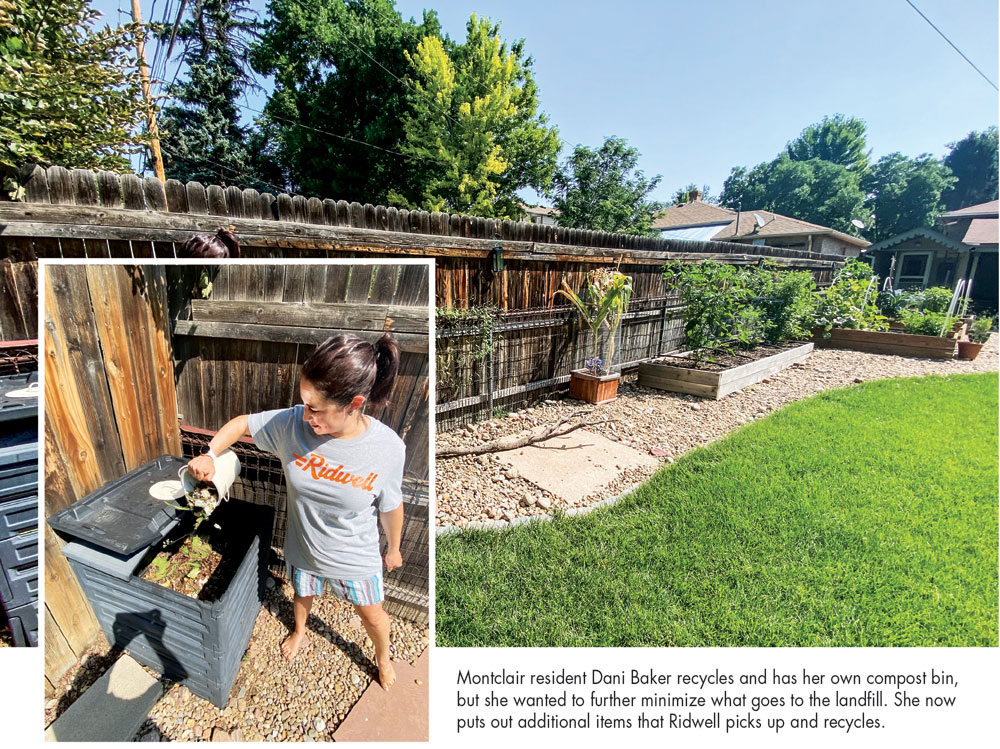
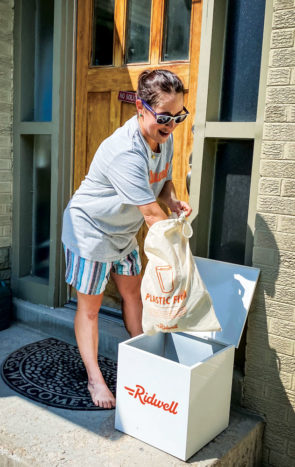
Photos of Dani Baker and her garden by Christie Gosch
Montclair resident Dani Baker made a New Year’s resolution to send as little trash as possible to the landfill. She already took full advantage of Denver’s curbside recycling program and put food scraps and yard waste in her backyard compost, but she was looking to do more. That’s when she heard about Ridwell, a new service that picks up hard-to-recycle items. “We live by the motto: reuse, repurpose, and recycle,” says Baker, “But it’s not easy to get rid of some things. You’re driving all over town or paying separate fees. With Ridwell, they take care of that for me.”
Ridwell was founded two years ago by Ryan Metzger, in Seattle, after he was frustrated by how difficult it was to recycle batteries. He created a pilot project in his garage—picking up items like household batteries, paint, and polystyrene foam from his neighbors and finding companies that could recycle them. After seeing tremendous support for the idea, he launched Ridwell, a subscription service that picks up hard-to-recycle items every other week and delivers them to organizations that can recycle them. The company now serves more than 35,000 people in 40 cities across the Pacific Northwest and, according to Metzger, has diverted more than 2 million pounds of waste from landfills.
This summer Ridwell began serving neighborhoods in East Denver. “We did our research. We know people in Denver love the outdoors. They like hiking and biking. And they’re interested in helping the environment, so it seemed like a natural place for us to expand,” says Metzger.
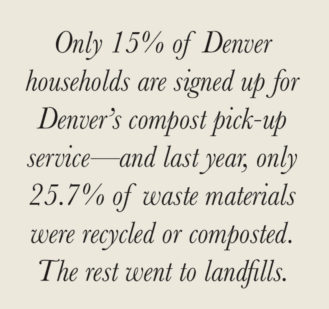 In just three months, he has signed up 700 Denverites, who pay between $12-$16 a month to recycle items that can’t be recycled through the city’s curbside recycling service. Metzger hopes to quickly expand throughout the Denver metropolitan area. Ridwell has forged partnerships with Colorado companies and organizations that recycle electronics, plastic bags, paint, clothing, and much more. Locally-based Atlas Molded Products, for example, takes Styrofoam and turns it into things like moldings and picture frames. Ridwell also does seasonal pickups: backpacks for an organization that provides back-to-school supplies for low income students, excess Halloween candy which gets donated to a group that plans birthday parties for homeless children. “One of the things I love most is that our members give us great ideas about organizations to partner with.”
In just three months, he has signed up 700 Denverites, who pay between $12-$16 a month to recycle items that can’t be recycled through the city’s curbside recycling service. Metzger hopes to quickly expand throughout the Denver metropolitan area. Ridwell has forged partnerships with Colorado companies and organizations that recycle electronics, plastic bags, paint, clothing, and much more. Locally-based Atlas Molded Products, for example, takes Styrofoam and turns it into things like moldings and picture frames. Ridwell also does seasonal pickups: backpacks for an organization that provides back-to-school supplies for low income students, excess Halloween candy which gets donated to a group that plans birthday parties for homeless children. “One of the things I love most is that our members give us great ideas about organizations to partner with.”
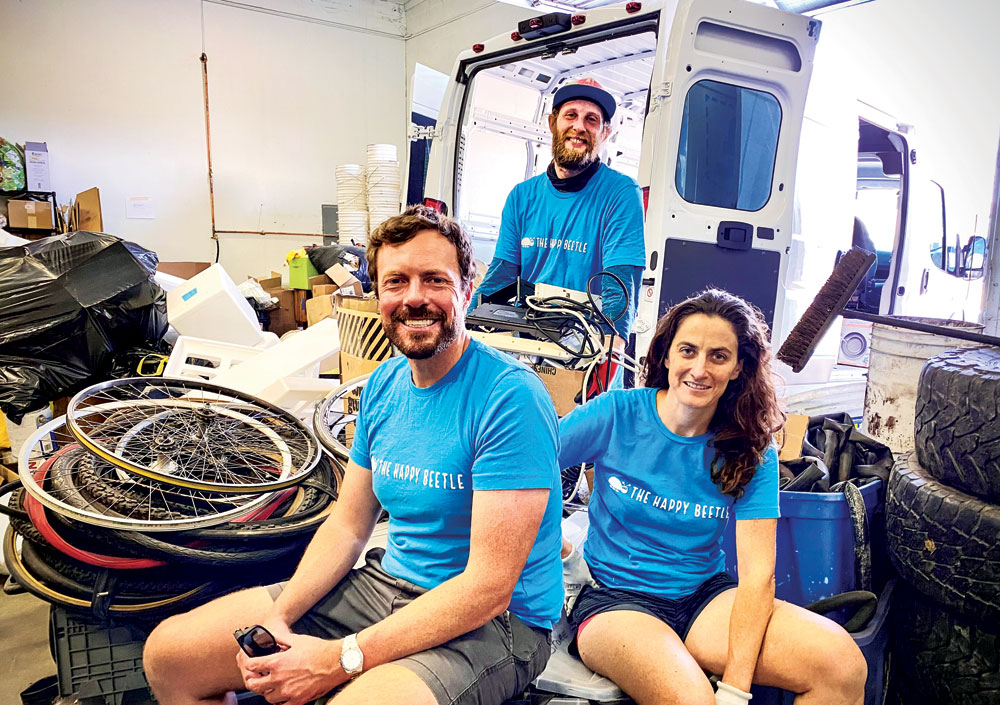
Dave Kiefner, owner and founder of The Happy Beetle, is pictured at his warehouse in NW Aurora with employees DeLancy Dunn (back) and Lilah Park. Photos of The Happy Beetle above and below by Steve Larson
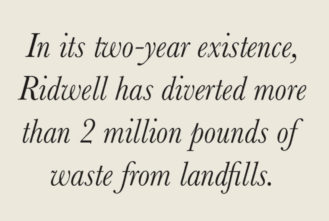 Ridwell isn’t the only boutique recycling service that is now serving the Front Range. This spring Dave Kiefner, who lives in the Whittier neighborhood of Denver, founded The Happy Beetle—a subscription recycling service that operates much like Ridwell, although pickups are scheduled monthly or quarterly. The Happy Beetle also partners with Colorado companies and organizations to recycle and reuse items. “We love working with partners that have a mission component. One group we work with is called SustainAbility, which hires people with developmental disabilities. We partner with a non-profit that sends shoes to Central America and helps women become entrepreneurs, and we take old bicycle tires to Green Guru Gear which turns them into backpacks,” says Kiefner. Another partner with The Happy Beetle is Dream Books, which provides books to Denver Public Schools and the Denver Public Library.
Ridwell isn’t the only boutique recycling service that is now serving the Front Range. This spring Dave Kiefner, who lives in the Whittier neighborhood of Denver, founded The Happy Beetle—a subscription recycling service that operates much like Ridwell, although pickups are scheduled monthly or quarterly. The Happy Beetle also partners with Colorado companies and organizations to recycle and reuse items. “We love working with partners that have a mission component. One group we work with is called SustainAbility, which hires people with developmental disabilities. We partner with a non-profit that sends shoes to Central America and helps women become entrepreneurs, and we take old bicycle tires to Green Guru Gear which turns them into backpacks,” says Kiefner. Another partner with The Happy Beetle is Dream Books, which provides books to Denver Public Schools and the Denver Public Library.
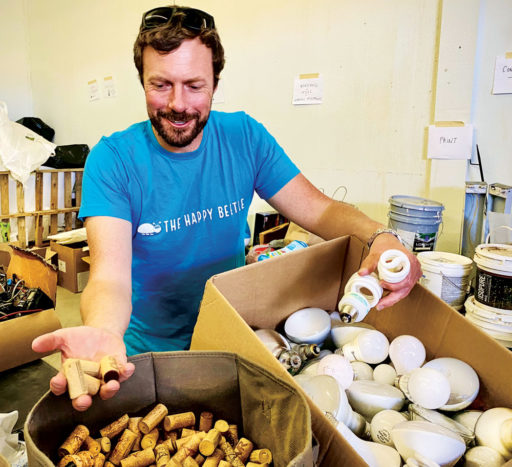
Kiefner points out boxes of wine bottle corks and light bulbs as examples of items that don’t have to end up in the dump—The Happy Beetle will recycle them.
Kiefner said he named his company The Happy Beetle after reading a book to his 4-year old son about insects and the role they play in reusing and breaking down dung and other things found in nature. “The beetle seemed to be a beautiful model of circularity, and the role it plays in a healthy ecosystem,” says Kiefner.
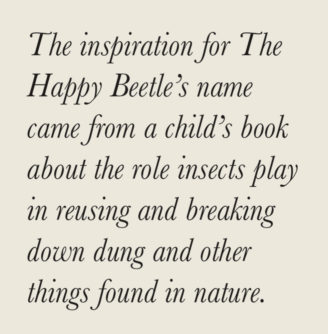 Despite these new services, Denver has a fairly low recycling and composting rate. Although Denver offers curbside recycling to all single-family homes and buildings with 7 units or less, it does not offer these services to larger apartment or condo buildings. And only 15% of Denver households are signed up for the compost pick-up service, which involves an extra fee. According to data provided by the city, last year only 25.7% of waste materials were recycled or composted. The rest went to landfills.
Despite these new services, Denver has a fairly low recycling and composting rate. Although Denver offers curbside recycling to all single-family homes and buildings with 7 units or less, it does not offer these services to larger apartment or condo buildings. And only 15% of Denver households are signed up for the compost pick-up service, which involves an extra fee. According to data provided by the city, last year only 25.7% of waste materials were recycled or composted. The rest went to landfills.
Although that was nearly a 2% improvement from the previous year, Danny Katz says it’s not good enough. He’s the executive director of COPIRG, an organization that advocates for stronger health, safety, and environmental standards. He says the problem is that the burden of recycling falls on consumers instead of the producers of these items. “If you ask most people, it’s hard to know what can go in the recycling bin. It’s complicated. We need a system where the burden is put on producers to not only manufacture items that are compostable or recyclable, but that the burden falls on them to make sure those products are diverted from landfills,” says Katz. He says that Canada and several European countries have such a program in place and his organization is advocating that Colorado adopt a similar system.
Until that happens, specialty recycling services like Ridwell and The Happy Beetle are likely to continue to expand as more and more consumers show an interest in reducing the amount of trash that is sent to landfills.
For more information visit:
TheHappyBeetle.com or email support@thehappybeetle.com.
Ridwell.com or email help@ridwell.com.


0 Comments